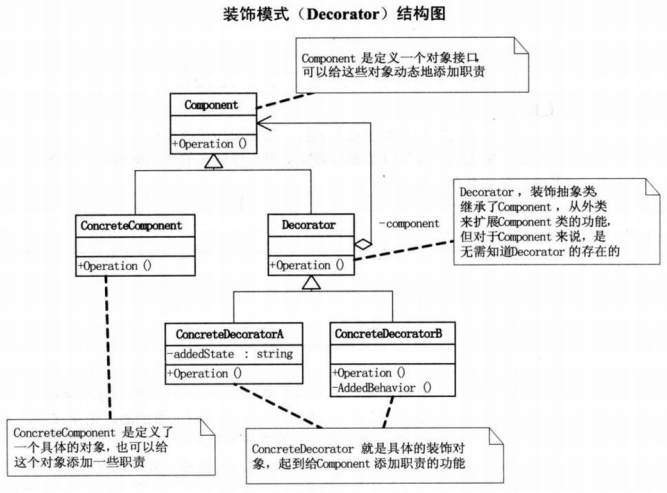装饰器¶
参考:《大话设计模式》第六章 穿什么有这么重要? - 装饰模式
装饰模式(Decorator Pattern)能够动态的给对象添加额外功能,其目的是分离核心和装饰功能
python不仅支持面向对象的装饰模式实现,还提供了高阶函数装饰器(decorator),从语法层面支持装饰模式
面向对象实现¶
需要向旧的类添加新功能时,使用装饰模式能够在不改变原有类功能的情况下新增功能

实现方式:
- 定义抽象类
Component,定义装饰方法operation - 原有类
ConcreteComponent实现该抽象类以及装饰方法 - 定义装饰类
Decorator,实现赋值抽象类对象方法set_component,实现装饰方法operation - 定义具体装饰类
ConcreteDecoratorA和ConcreteDecoratorB,实现装饰方法operation - 定义原有类对象以及具体装饰类对象,使用方法
set_component进行对象赋值 - 最后执行装饰方法
# -*- coding: utf-8 -*-
# @Time : 19-6-11 下午4:20
# @Author : zj
from abc import ABCMeta, abstractmethod
class Component(metaclass=ABCMeta):
@abstractmethod
def operation(self):
pass
class ConcreteComponent(Component):
def __init__(self):
super(ConcreteComponent, self).__init__()
def operation(self):
print('concrete component')
class Decorator(Component):
def __init__(self):
super(Decorator, self).__init__()
self.component = None
def set_component(self, component):
assert isinstance(component, Component)
self.component = component
def operation(self):
if self.component is not None:
self.component.operation()
class ConcreteDecoratorA(Decorator):
def __init__(self):
super(ConcreteDecoratorA, self).__init__()
self.addedState = None
def operation(self):
super(ConcreteDecoratorA, self).operation()
self.addedState = 'New State'
print('concrete decorator a')
class ConcreteDecoratorB(Decorator):
def __init__(self):
super(ConcreteDecoratorB, self).__init__()
def operation(self):
super(ConcreteDecoratorB, self).operation()
self.added_behavior()
def added_behavior(self):
print('concrete decorator b')
if __name__ == '__main__':
cc = ConcreteComponent()
cda = ConcreteDecoratorA()
cdb = ConcreteDecoratorB()
cda.set_component(cc)
cdb.set_component(cda)
cdb.operation()
实现如下:
concrete component
concrete decorator a
concrete decorator b
上述实现中,首先执行原有类,然后按顺序执行具体装饰类,实际情况中可灵活进行调整
python装饰器¶
参考:
python提供了decorator -- 装饰器用于装饰模式的实现
语法糖@wrapper¶
简单实现如下:
def log(func):
print('hello world')
return func
@log
def concrete_thing():
print("concrete thing")
if __name__ == '__main__':
concrete_thing()
执行方法concrete_thing()输出如下
hello world
concrete thing
等同于执行方法log(concrete_thing)(),其中语法@wrapper是python提供的语法糖
元信息变化¶
另一种实现是在装饰方法中新建内部函数并返回内部函数,实现如下:
def log(func):
def wrapper(*args, **kw):
print('before func')
func(*args, **kw)
print('after func')
return wrapper
@log
def concrete_thing(i, j):
z = i + j
print("concrete thing: %d" % z)
if __name__ == '__main__':
concrete_thing(1, 2)
print(concrete_thing.__name__)
上述代码执行具体方法concrete_thing并打印其函数名
before func
concrete thing: 3
after func
wrapper
函数名__name__发生了变化,可通过方法functools.wrap进行校正
from functools import wraps
def log(func):
@wraps(func)
def wrapper(*args, **kw):
print('before func')
func(*args, **kw)
print('after func')
return wrapper
@log
def concrete_thing(i, j):
z = i + j
print("concrete thing: %d" % z)
if __name__ == '__main__':
print(concrete_thing.__name__)
输出如下:
concrete_thing
装饰器参数¶
可以添加参数到装饰器,需要再包装一个函数到之前的装饰器函数
from functools import wraps
def use_logging(level):
def log(func):
@wraps(func)
def wrapper(*args, **kw):
if level == 'warn':
print('warn')
else:
print('nothing')
print('before func')
func(*args, **kw)
print('after func')
return wrapper
return log
@use_logging('warn')
def concrete_thing(i, j):
z = i + j
print("concrete thing: %d" % z)
if __name__ == '__main__':
concrete_thing(1, 2)
print(concrete_thing.__name__)
其实先等同于use_logging(3)(concrete_thing)(3, 2),输出结果如下:
warn
before func
concrete thing: 3
after func
concrete_thing
添加多个装饰器¶
可以分别进行多个装饰器的操作
from functools import wraps
def use_logging(level='verbose'):
def log(func):
@wraps(func)
def wrapper(*args, **kw):
if level == 'warn':
print('warn')
else:
print('nothing')
print('before func')
func(*args, **kw)
print('after func')
return func
return wrapper
return log
@use_logging('warn')
@use_logging()
def concrete_thing(i, j):
z = i + j
print("concrete thing: %d" % z)
if __name__ == '__main__':
concrete_thing(2, 3)
输出如下:
warn
before func
nothing
before func
concrete thing: 5
after func
after func
从上到下顺序执行装饰器,运行第一个装饰器use_logging('warn'),依次进入log->wrapper->func,执行func时触发第二个装饰器use_logging(),先执行log->wrapper,再执行func,然后依次退出(func仅执行一次)
装饰器类¶
之前的装饰器操作在函数上,同样可以定义包装器类
from functools import wraps
class Foo(object):
def __init__(self, level='verbose'):
self._level = level
def __call__(self, func):
@wraps(func)
def wrapper(*args, **kw):
print('before class')
func(*args, **kw)
print('after class')
self.notify()
return wrapper
def notify(self):
if self._level == 'verbose':
pass
else:
pass
@Foo()
def concrete_thing(i, j):
z = i + j
print("concrete thing: %d" % z)
if __name__ == '__main__':
concrete_thing(2, 3)
模拟上一节面向对象实现如下:
from functools import wraps
class Decorator(object):
def __init__(self, info):
self._info = info
def __call__(self, func):
@wraps(func)
def wrapper(*args, **kw):
self.notify()
func(*args, **kw)
return wrapper
def notify(self):
print(self._info)
class ConcreteComponent:
def __init__(self):
pass
@Decorator('concrete decorator a')
@Decorator('concrete decorator b')
def operation(self):
print('concrete component')
if __name__ == '__main__':
cc = ConcreteComponent()
cc.operation()
或者
from functools import wraps
class Decorator(object):
def __init__(self, info):
self._info = info
def __call__(self, cls):
@wraps(cls)
def wrapper(*args, **kw):
self.notify()
return cls()
return wrapper
def notify(self):
print(self._info)
@Decorator('concrete decorator a')
@Decorator('concrete decorator b')
class ConcreteComponent:
def __init__(self):
pass
def operation(self):
print('concrete component')
if __name__ == '__main__':
cc = ConcreteComponent()
cc.operation()
concrete decorator a
concrete decorator b
concrete component